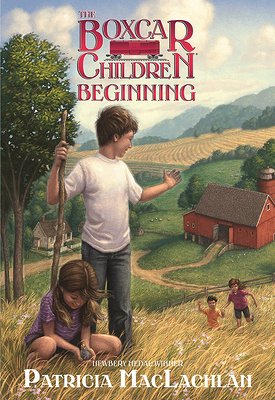This post contains thematic spoilers.
I have put off writing my thoughts on the prequel to the Boxcar Children series for more than two weeks now. It’s not that I didn’t like it. On the contrary, I really enjoyed seeing the children interact with their parents, relish their life on a small farm, and find their own ways of enjoying life over the course of one year. It was quite fun to revisit Henry, Jessie, Violet, and precious Benny in their home setting.
However, something about the book as a whole didn’t resonate well with me. Is it because I just can’t imagine the emotionally stable children of this book then running away and avoiding adults (such as their unknown grandfather) as they do in the first chapters of the original The Boxcar Children by Gertrude Chandler Harris? Is it because the book had to, of course, end in the death of their parents so the children would be orphans, as they are in the first chapters of the original?
The Boxcar Children Beginning: The Aldens of Fair Meadow Farm (Albert Whitman and Company, August 2012) was written by Patrician MacLachlan, a master storyteller of historical fiction in rural communities featuring close-knit families. She did a wonderful job, as always, at creating the setting in rural, depression-era America, and the children’s personalities seemed to fit the already created personalities as we know them from the other books. My son and I loved the adventures the kids had as they looked for things to do.
The basic premise of the prequel is that even though many in the surrounding communities are struggling, the Aldens are doing all right. As a family, they use their abilities and home resources to provide service to those who need it, including a family stranded when their car dies in a snowstorm. The story begins with Jessie making a list of things to do, and the kids find creative and delightful ways to fill their time. It was a great reminder of the creativity inherent in children even without television and many material things to play with. My son (age 4) and I enjoyed the adventures the kids had at home.
The Aldens never seemed to take their blessed life for granted, and the entire book had a tone of hope and peace. Even when the parents die, the book is so toned down that my four-year-old son (with whom I read the book) didn’t understand that they were dead. “They just went away,” he tried to convince me when I tried to explain otherwise. And this is where I lost my love of the book: the tragedy just didn’t seem real, and the children’s subsequent actions (that is, running away from their friends and their unknown grandfather) did not jive with the rest of the book.
That said, maybe it’s a good thing that the four-year-old with me (who loves the Boxcar Children) didn’t understand the underlying tragedy. In the end, he loved this book as much as the others. Maybe that is what makes it into a great book and not just a okay one, which is how I read it. From my perspective, maybe we should have left the series alone. From my son’s perspective, there could never be too many stories of the Alden children.
Note: I read a digital review copy from the publisher via netgalley.com for review consideration.

